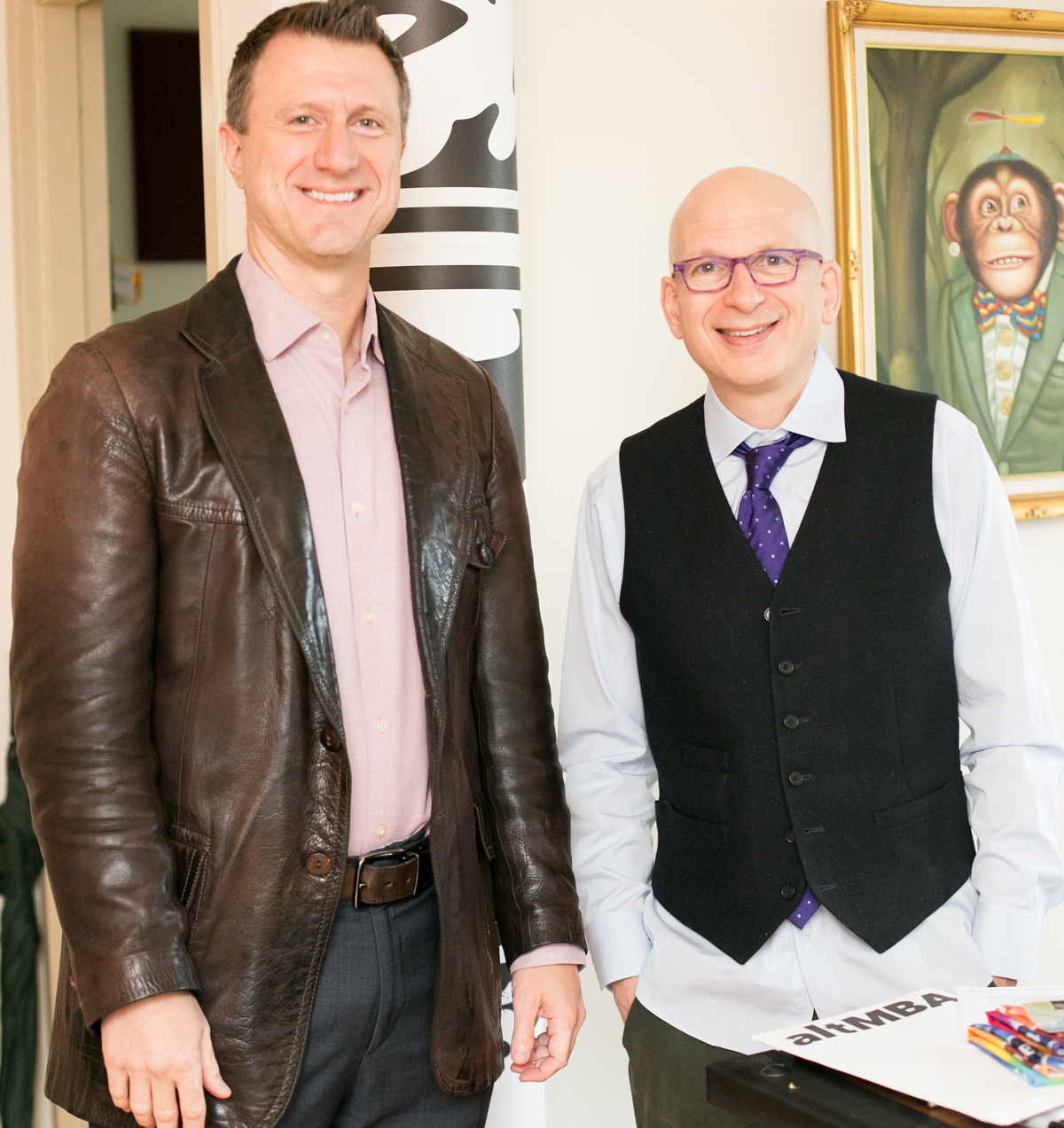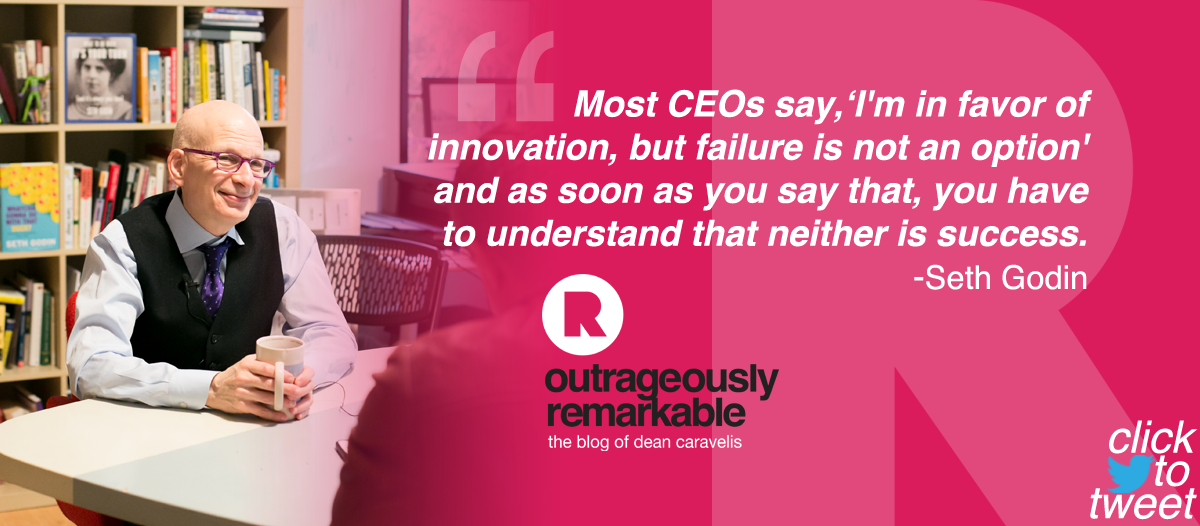I was having fun in Koreatown, Manhattan, eating a delicious dinner and catching up with a friend that I hadn’t seen in a decade. My friend, Jeff (also evidently having a blast) exclaimed, “Let’s get a second bottle of Soju!” At that instant, with a light buzz, I had a moment of clarity. I admitted my anxiety about what a big day I had coming up and it brought me to immediate stone cold sobriety. You see the following day, I was going to be interviewing Seth Godin in the morning before heading to Brooklyn, an hour away, to interview Tim Urban around lunch. Time allowing, I would also be connecting with Yin Lin in the afternoon. Oh, and the weather was supposed to be horrific. Uh oh.
“Actually, I’m going to have to pass on that bottle. It was great seeing you! I gotta go. Didn’t realize how early I need to wake up!”
For those of you not familiar with Seth Godin, let me summarize just how significant this man is in the business world. He is the author of 18 best-selling books, a member of the Direct Marketing Hall of Fame, writer of a hugely popular daily blog, and one of the most thoughtful and generous human beings that you could ever meet. He’s also the founder of the altMBA program, which I have completed, and more recently The Marketing Seminar. Now that you’re all caught up, let’s get back to my lead-in …
I’m not exactly sure when I first heard of Seth, but I found my first mention of him in a blog post that was written in 2011, during the early days of Blezoo. This was right around the time that I began reading his various masterpieces. His books validated so many things that I knew to be true, but didn’t comprehend were possible since I was still stuck in a corporate status quo mentality.
You can go to the edges. You can take the long cut. You can, and should, focus on delight. You can challenge, everything.
I could go on and on.
In 2015, Seth posted a link on his daily blog to a workshop called “Ruckusmakers” that he would be hosting in New York. I showed it to my wife (since we had a calendar conflict), and she immediately replied, “There’s no way you are missing this! Go!” So, I applied immediately and was one of the approximately 80 individuals selected to attend. The lessons, relationships, and inspiration from that weekend motivated me to transform Blezoo into what it has become today. A few of those ‘Ruckusmakers’ were also the ones who urged me to apply to the altMBA program as well. That brings us full circle to this blog because Outrageously Remarkable was born out of an altMBA project. I really hope you enjoy the interview as much as I did!
Quick note: This is PART 1 of a 2 part series. Part 2 is with Tim Urban; the amazing author of the blog Wait But Why.com. To receive exclusive behind the scenes content, stories & takeaways for both parts subscribe to my e-newsletter where I will share more about my adventure to meet with Seth and then navigate New York while interviewing Tim in the back of a car. Can’t wait to share with you! Now let me take you to the morning of my interview with Seth Godin:

[Setting: I took the early morning train departing from Grand Central Station to meet Seth at his office. Meeting me at the Hastings-on-Hudson train stop were Erik and Adeline who were going to be my companions for the day; helping me navigate the boroughs of New York and documenting the day through amazing pictures. By the way, being greeted by people you’re instantly friends with, but have never met in your life, is ‘The Most altMBA Thing’ you can do. It’s that kind of tribe and we were about to meet with the tribe leader. We promptly arrived at Seth’s office where he welcomed us and made coffee while we all chatted. After going into another room, Seth and I put on lavaliere microphones. I hit play as Seth was joking around with Adeline and Erik … ]
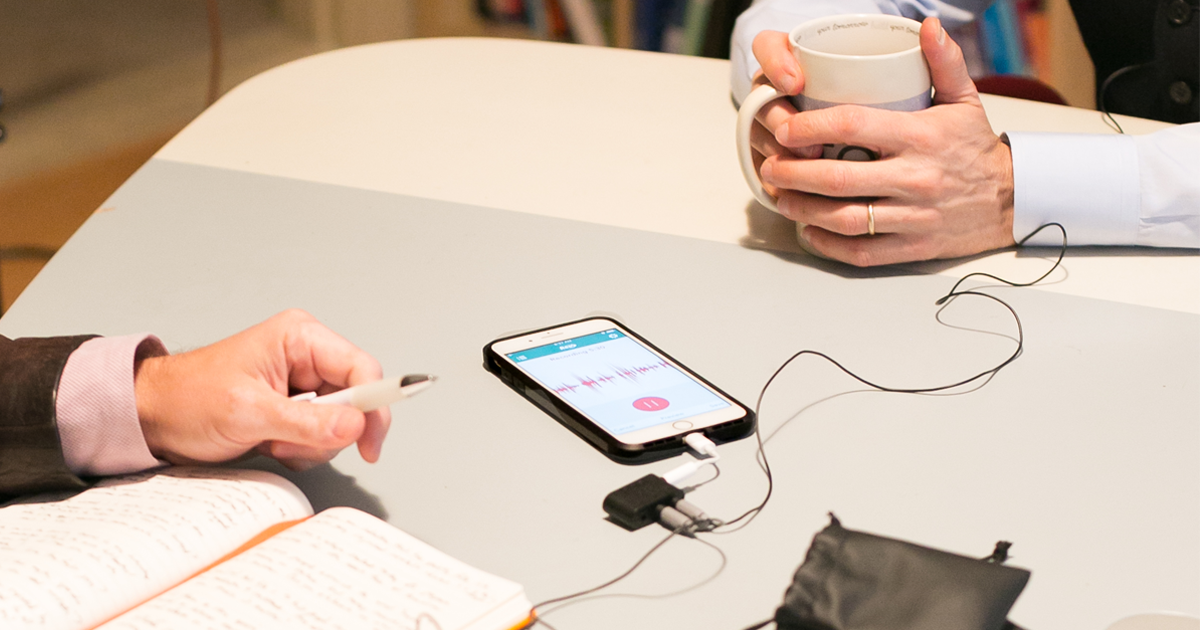
Seth: … two cannibals are eating a clown and one says to the other, ‘Does this taste funny to you?’ [laughter] …You’re a sucker for cannibal jokes. These other two cannibals are eating lunch and one says, ‘You know, I never did like my mother-in-law.’ The other one says, ‘Shut up and just eat the noodles.’
Dean: Ok Seth, I didn’t send you sample questions because … you’re Seth Godin, so we’re going to just go.
Seth: I would get bored if you had sent the questions.
Dean: [laughs] Well, I want to thank you for this interview, but mostly, I want to thank you for writing and building and challenging me to grow. Obviously, today I woke up with adrenaline, excitement. I was up and out early. I was on fire. What puts you on fire? Do you have a certain thing that you get to do or a project on the horizon that gives you that adrenaline?
Seth: It’s pretty simple, I’m fortunate. It’s people like you. When I watch the impact that my work has on other people, it fuels me to do it more. If I didn’t know it was working or see the resonance it was having, I wouldn’t keep doing it.
Dean: Are there any sort of projects on the horizon that you can tip us off on that give you that excitement as well?
Seth: Well, I mean, the horizon hit three days ago when we launched the Marketing Seminar. We’ve got more than 1,000 people now and that’s going to keep me busy for the next 100 days. I used to have a ten-year horizon, now it’s more like a 100-day horizon and that’s just fine with me.
Dean: And the Marketing Seminar, which I signed up for as well out of both curiosity and eagerness, who is it for and what is it for?
…dripping it over time so you can’t just binge it like Game of Thrones and be done.
Seth: Who’s it for? It’s for people who think their work would be better if they could spread their ideas more effectively. It’s for people who already have a posture of wanting to make a change happen, but get stuck with all the noise, all the social media, all the spending money or not spending money. What’s it for? I think, no I know, it would be much easier to sell people on watching a bunch of videos. But by refusing to do that, I’m giving people learning cohorts and dripping it over time so you can’t just binge it like Game of Thrones and be done. By doing it this way, I think I’m going to get under people’s skin. I think I’m going to help them see things differently and if they learn to see things differently, then their instincts and good judgment will cause them to act differently, and that will cause their change to happen. So, it’s not the altMBA. The altMBA is much more focused on the narrative that we tell ourselves about the way we walk through the world. The Marketing Seminar, which has no coaches and is much more horizontal, is about seeing how marketing actually works today.
Dean: Seth, you talk a lot about the change you’re trying to make and I know that with altMBA, you created this kind of intensive community and a different way to learn. I know that you mentioned in the past that when people go and sign up for these online courses, the drop off rate is so high. Is the Marketing Seminar kind of an extension of the altMBA? Is the change you’re trying to make in the world now geared more towards online learning? Is that the direction you’re going?
Seth: What I’ve discovered is that it’s really hard to persuade someone to buy and read a book. It shouldn’t be, but it is and so putting your heart and soul into another book when people haven’t read your last book … even though they loved it, they didn’t read it … the medium is different. So what’s a medium for making change happen? And what I’ve discovered is that these sorts of interactions are stickier and more powerful than a book could be. They don’t reach as many people, but the cohorts that are being touched, it matters to them. So for now, that’s a focus.
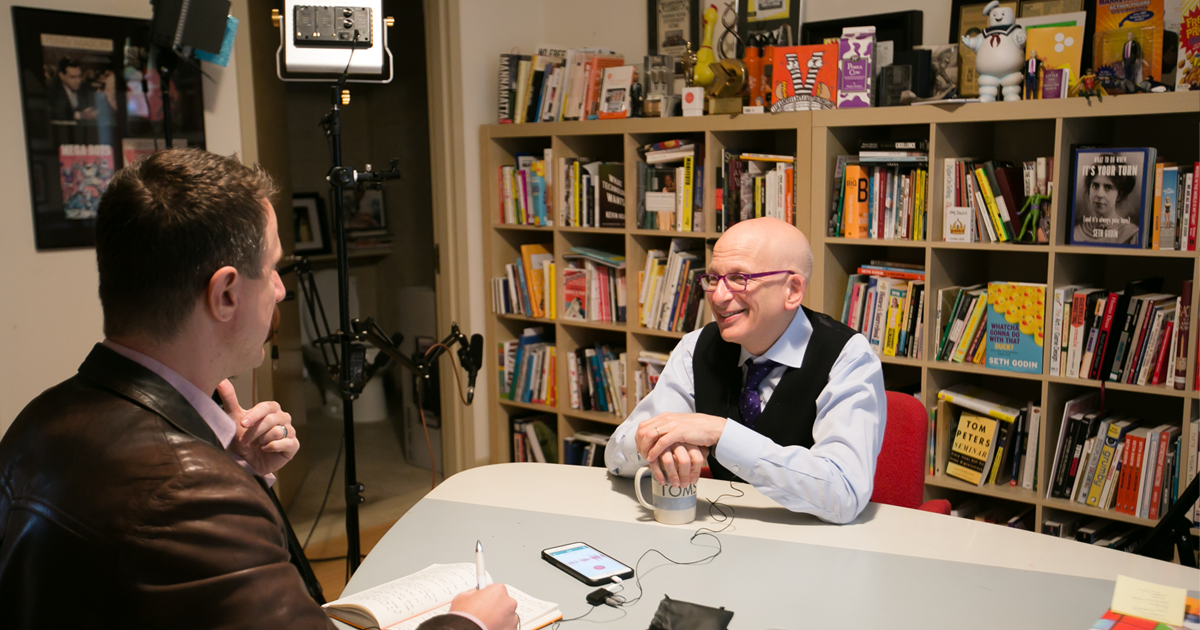
Dean: I’m going to assume that the resistance exists for you, too, by definition. As a best-selling author, as a thought leader, how does the resistance emerge for you?
Seth: Mostly in checking my email. It’s very easy for me to spend 6 hours cleaning my email box. Everyone loves it when I do that. Tons of positive feedback, but I haven’t created anything that was scary or anything that was particularly difficult. So if I’m doing that, it’s a sign to me that I’m hiding from something more frightening and powerful.
Dean: We’ll make sure that my readers know not to email you, and personally, that message has resonated and I’ll make sure that the one time I email you a year is about something important!
Seth: [laughing] You always send me just the right kind of email, thank you Dean.
Dean: Currently altMBA is in session and it’s 10 and 11, right? What does long-term success look like for the program?
Seth: This is it. The idea of showing up and chopping wood and carrying water and doing it again. I mean, Harvard Business School has been around for 70 important years or so, maybe 80, and we’ve only been two, so we have a ways to go. But I’m not focused on making it bigger, I’m focused on making it a consistent, productive experience for the people who want to take it.
Dean: So long-term success is really to continue what you’re doing … just continuing to grow? Is there a vision for the long-term success for it?
Seth: Well, we have 1,200 alumni and they would tell you that their lives are transformed by it. By this time next year, we’ll have 2,000 alumni. That’s a lot of people and I’d like it to be 10,000 over time, but I know that if I make it grow faster than it wants to grow, I’ll have to sacrifice and I don’t want to do that.
Dean: What’s the biggest insight that you learned from the program after you launched it that you didn’t realize beforehand?
Seth: I didn’t realize how quickly people would shift gears and care about and for each other. The power of these cohorts is extraordinary and it’s just a testament to how cruel and rough the outside social media world is. When you have a closed group and the moderation and the arc that we have, people bring their best selves and it’s really fascinating to watch those best selves persist after the program is over.
Dean: My first-week group has such an intense bond. We send What’s Up messages to each other and keep in touch and encourage each other in different ways… Seth, you know that the blog is called Outrageously Remarkable. Who is the most outrageously remarkable person that you’ve ever met and why?
I still have an ‘I Miss Jerry’ sticker on my Prius
Seth: [long pause] I think it’s important to get the words right here. So I use the word ‘remarkable’ to mean something different than many other people do. I use it to mean ‘worth making a remark about’ because it’s not up to me to say you are remarkable or you’re not, but if people talk about somebody, that’s remarkable. So we can talk about someone who is a clown, who is a loser, who is hurting the people around them. They’re bad, they’re negative, they’re taking away from our culture, but they’re still remarkable. So we have to be really careful to say that your goal is not just to be talked about, your goal is to be talked about in a way that moves a message forward. I’ve met so many people who are doing this sort of work. My friend, Jacqueline, who runs the Acumen Fund … Jacqueline lives a life that transforms millions of people and she does it in a way that you can’t help but note. She’s not doing it so that people will talk about it, which is part of why you talk about it. There are other people like Zig Ziglar, who was a friend who passed away years ago … by the number of times that I have mentioned him, he is remarkable. By the number of people who can point to how his work made a shift in their lives, he is remarkable. But then there are remarkable people, you know Keller Williams, the musician, who doesn’t have a platform near the size of Zig’s and doesn’t do something as profound as he did, but if you go to one of his concerts … or you’re a Dead Head, I still have an ‘I Miss Jerry’ sticker on my Prius … Jerry was remarkable. I mean, I never met him, but the point is that you can’t just pick a couple, they’re everywhere. So I don’t think it’s a challenge of ‘most remarkable,’ it’s just are you reaching your potential of doing this positive work. That is remarkable.
Dean: In my interviews, mentorship has come up over and over and over, and I wanted to know, is there a specific mentor of yours that has influenced and shaped you into who you are today the most?
Seth: I have a controversial point of view about this. I think mentorship is overrated, over talked about, and a trap. It’s a trap because you’re going to spend too much time trying to find a mentor and that’s your excuse for not moving forward. Mentoring doesn’t scale. Someone like Pat Machaudrin can mentor 15 people, but she could be your hero without you ever meeting, and heroes strike me as being far more effective than mentors. Heroes are people who you can ask yourself, ‘What would they do?’ That person doesn’t know you’re doing that, but they are modeling behavior for you and you can have a hero tomorrow … and if you need to hire a coach, go hire a coach because it’s worth the money. And a coach plus a hero? I think that gets you way further than the one-way, hard-to-scale, relationship that you’re hoping for from a mentor.
Dean: So would you say then that a hero is more inspiration and a model, whereas people view mentors as kind of a one-to-one feedback loop?
You don’t need a famous, busy person, you just need someone who cares about you.
Seth: When I think about the people who I’ve been fortunate enough to have been mentored by, the number of things they told me that I couldn’t learn from a book was zero. That’s not what you get from a mentor and if you think that you need that one-on-one specific coaching, I think you’re missing the point. What you get from a mentor is a human-being that you respect, who cares about you, and keeps you on track. Well, they are basically being a coach and what I’m arguing is that now that the coaching profession exists, go get yourself a coach. It doesn’t have to be a famous person and it’s worth the money it costs you because a coach will call you out and say, ‘Why are you looking for some famous, busy person to be your coach?’ You don’t need a famous, busy person, you just need someone who cares about you. And the models that these heroes of mine and yours can lay out for us are priceless and it seems a shame to ignore them just because that person is too busy to answer your email.

Dean: Well speaking of emails, I have kind of a forward-looking question for you about the future. I just recently heard that 60% of desk jobs are going to be replaced by A.I. in the next ten years. If you could send one email to all of those people today, what would it say?
Seth: Well, it might start with I am Prince Mabuka. [Dean laughs] I have found $5 million, can you please send a money order? [both laughing] When the Internet was coming, I stood up and so did a lot of other people and said, ‘The Internet is coming.’ In 1997, I gave a speech to the Newspaper Publishers of America and I described in extreme detail exactly what was going to happen to them. We don’t have an issue with people being surprised when the future shows up. They deny it because it’s uncomfortable to consider. The same problem we have with the fact that the climate is changing. It’s easier to deny it than to live in advance with this thing you’re afraid of. So I’m not sure I could send an email that would make any difference whatsoever. My blog is a little different in that it’s an email that people asked for and so drip by drip, that’s who I’m writing it for. I’m writing it for all of those people … You know, when I was writing to travel agents and newspaper people 15 years ago, I was outlining how they could avoid what was going to happen next. And now it’s all of us, right? The fact that I’m telling people it’s coming, that other people like Kevin Kelly before me, are telling people that it’s coming doesn’t matter. What matters is can we choose to contribute in a different way because we want to, not just out of fear.
Dean: Is there an industry that has quietly fallen into the status quo, rejecting the inevitable change, and that you feel is in real danger right now?
I think an exception is Amazon sheerly because of the force of will of one man.
Seth: Well, could we say that there is an industry that hasn’t? Right? I mean, I worked at Yahoo. Yahoo was the future in 2000 and it’s only 2017 and they’re gone. As soon as you go public, as soon as you layer in 500 or 1,000 people, you’ve said, ‘We’ve decided what we do and how we do it’ and it’s really difficult for those organizations to change. I think an exception is Amazon sheerly because of the force of will of one man. That didn’t happen at Apple. Apple is obsolete, they just don’t know it yet. The most valuable company in America? It’s impossible for me to imagine that they’re the most valuable company in America because most people in that building are working very hard to make the stock price go up one dollar tomorrow; not to say that if we were treating today like 1983, what’s our Macintosh? I refuse to believe that we are done with technology. I refuse to believe that this is it. So what happens after this? And those shifts are big bets. It’s a big bet for a tiny organization like mine to say I’m not going to make books and do speeches the way I used to, I’m going to do this instead. That’s a really big bet. I do that not because I try to build the most valuable company in America, but because I’m trying to contribute in ways that scare me and that are useful. What happens once a company becomes an industry is that they play a different game.
Dean: I heard somebody mention the Netflix example recently. I mean, it was a DVD company, which then became a movie company, which now became a TV show content creator. Pretty amazing. And you also mentioned Amazon. I read a statement from Jeff Bezos recently talking about how he believes in having ‘strong beliefs, loosely held.’
Seth: [laughs] Yeah, he says that as the CEO. Right? As the CEO, he’s saying that everyone here should do what I say and if you don’t really agree with it, just give it a try. And he gave one example of where he takes the approach of I’ll go ahead and do it, but the challenge going forward if you have an organization is to understand how you’re going to process failure. Most CEOs say, ‘I’m in favor of innovation, but failure is not an option’ and as soon as you say that, you have to understand that neither is success. All innovation is a series of failures, and big companies, public companies don’t like to fail.
Dean: I’ve been reading The Lean Startup again just to get that ingrained into my brain as I’m doing this blog and a couple of other things, so I wanted to ask you Seth, what can a college student today be doing to prepare themselves for the workforce of tomorrow?
There has never been an easier time to hustle and make a buck than right now …
Seth: Oh that one is easy. Don’t go to class. You’re going to graduate anyway. Get a C, that’s plenty, and spend 30-40 hours a week starting a project. That project doesn’t have to be for money, but it would be nice if it was. No one knows that you’re supposed to be doing this so no one will notice that it’s happening until it works. Just build something. Build a giant conference. Build a worldwide series of events. Build a company that makes a thing. Build a company that finds a thing that’s made somewhere else and sells it to people. Start it now, in college. Last night, I had dinner with the founder of Uncommon Goods, which is a catalog company. He started it 18 years ago on the kitchen table, like all direct marketers. This year in November, he’ll have over 1,000 employees; every person getting paid double the minimum wage, at a minimum. All you need is stamps. You don’t even need stamps if you build something on the Web. Start something now and go to class when you have time.
Dean: See, my parents didn’t know I was doing it right the whole time!? [both laugh] … so I feel like most people associate the word ‘success’ either with money or stature. But many successful people don’t matter. Can you elaborate more about what it means to matter?
Seth: I would say the simple answer is, would they miss you if you were gone? If you didn’t show up with that email, if you didn’t show up with that project, would people call you and say, where is it? I’ve been waiting for it, what’s up with you? There has never been an easier time to hustle and make a buck than right now, but the problem with hustling and making a buck is that it doesn’t leave you any better off than where you were when you started. Whereas if you can build relationships built on trust and anticipated personal and relevant connection, then you have a shot to build an asset for the future.
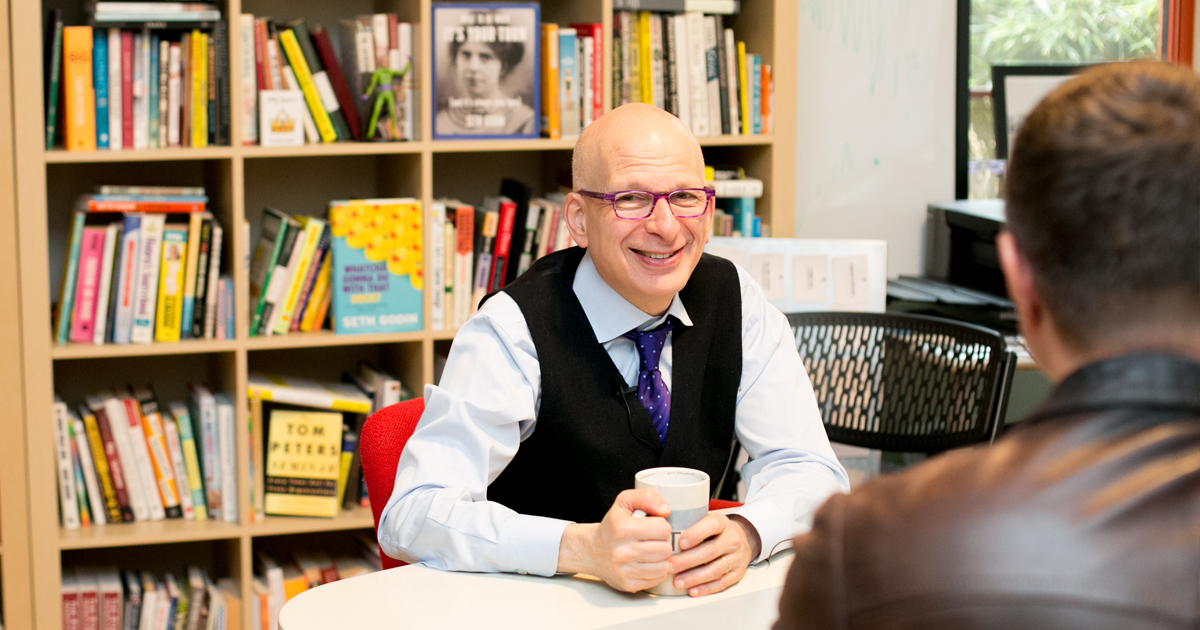
Dean: My goal with this blog is to help people stand out and to give them motivation and confidence. Any advice on how I can make it matter?
Seth: Well Dean, the thing is that you matter. I think that is the first step. When you are by yourself and looking in the mirror and the person that you see is someone who cares, people can tell when we care. They know the difference between someone hustling for them and someone hustling them. I have a blog post coming out in a few days about trees and the difference between the tree emoji and the boom emoji. Lots of people like the boom emoji, right? I’m way more interested in the tree emoji. It might take a whole generation, but if you water it, and you take care of it, and you give it affection, you will end up with a tree. And we need some of those.
Dean: Trees that people plant that will never see the shade, but they’re still planting them. Is there a story that you’ve told yourself about social or Internet marketing that you’ve since changed your mind about or are thinking about changing your mind about?
Seth: Certainly, the biggest one was being wrong about the world wide web, which I remind myself of every single day. I was there, most people weren’t. It was 1992, 1993, 1994, I could have started anything. I could have started Yelp and Groupon and Facebook and Google … and instead, I didn’t because I didn’t get it. I didn’t see it as it could be. Does that happen to me a lot? Well, I’m trying to figure out how much longer we’re going to try to make things shorter … 140 characters, a couple of emojis, SMS … There is nothing that I can think of that’s shorter than that so at some point, we’re going to go back to longer. We’re going to go back to more meaningful and I’m trying to figure out what that looks and feels like. So I’m on the fence. I don’t know yet.
Dean: In many ways, I can see that happening now. Like with Tim Ferriss’ blog. I mean, super long-form. I mentioned Tim Urban, who I’m meeting with later today. We were just talking about his posts. So maybe it’s just the edges, so it’s like, ‘Oh, you’re going to this edge? Let me go back over here.’
Seth: Exactly.
Dean: What is something that is true about you that most people wouldn’t believe?
Seth: I don’t work very hard. [long pause … both laugh together]
Dean: I still don’t believe it even though you just told me it to my face!
I get to do this work in a way that feels sustainable to me.
Seth: I’ve worked really hard in my lifetime. Dug in, had 50 direct reports, processed huge amounts of information on a daily basis. Boom, boom, boom, boom, boom, launched things, sprinted, and then dropped in a heap at the end of the day. And because I don’t go to meetings, and because I don’t watch television, and because I have a very tiny team, I don’t do any consulting, and because I don’t take projects I don’t believe in, it doesn’t feel like I’m working very hard. I get to do this work in a way that feels sustainable to me. I create a lot of output because I don’t waste time hiding. So it looks like I’m working really, really hard because if anyone else went to all those meetings and did all that other stuff and tried to keep up with me, they’d be exhausted. The insight is that if you strip away the stuff that you actually don’t need or care about, you can get a lot done without working very hard.
Dean: What motivates you, then?
Seth: You asked me that right at the beginning, right? It’s what change am I making in the people around me. If I can see somebody look at the world differently, walk through the world differently … walks up to me in an airport with a challenge coin and talks about how their life has changed after the altMBA, that’s enough to push through the next time something difficult comes along.
Dean: Seth, you must recognize that you’ve built this tribe of engaging, thoughtful, and generous people …
Seth: Good-looking, too!
Dean: [laughs] Thank you. [Seth: Hey, there’s a few of you here!] Yes, I’m thanking you on behalf of the group here today! And so this aspect of being engaging, thoughtful, and generous is really a reflection of you. What I want you to do is, putting your humility aside, can you tell me what is it that makes you outrageously remarkable, because you are and in a good way!
So instead of authenticity, we need consistency.
Seth: Okay, well, I’m not going to use your term because it’s your term and you know what you want it to mean, I’ll use my term. I create remarkability with intention. I’m doing it on purpose. There is this model that some people have … you are the way you are, you’re born the way you’re born, you’re ordained to do the things you’re going to do … I don’t buy that at all. I think that authenticity is a trap. No one has been authentic since they were 3 months old, laying in a diaper filled with poop. Ever since then, we’ve done things on purpose to get a reaction, to get a response. We do it intentionally. So we put on clothes in the morning even though we don’t feel like it, we brush our teeth even though we don’t feel like it because we know that doing those things will get us the thing we need. So instead of authenticity, we need consistency. We need to be able to know that someone is going to keep their promise; do what they said they were going to do. So in my case, when I was writing for Fast Company, the reason I wrote those columns was so that people would xerox [copy] them and share them in their office. That is a definition of remarkability. I didn’t write it for my readers, I wrote it so my readers could give it to other people. I wrote more words for Fast Company than anyone in their history, my stuff was their most shared because I wrote it that way on purpose. When Purple Cow came out, I put it in a milk carton not because I needed an envelope, but because if a book came to you in a milk carton, you would take the advice in the book and show people the milk carton … the definition of remarkability. So, I want to do this work, I want to make this change, and that is separate from ‘I need it to spread in order for it to work’. You can do that with intention. There are lots of ways to be remarkable. You can be a jerk, you can go on Shark Tank, you can beat people up, you can be a professional wrestler … I made the choice to do it in a way that I’m proud of and I’ve been really fortunate that it’s resonated with people like you guys and that lets me be the person I want to be, but it also leads us to have something to talk about to bring other people along.
Dean: Purple Cow and Linchpin are two books that I often recommend, but you know, the one that consistently comes up when I’m talking to people and they’re asking me questions is The Dip. It’s such a fundamental thing. People are asking me, ‘Where do you think I’m at with this project?’ And I tell them that they really just need to read that book because they are the ones who have to understand whether it’s a cul-de-sac or whether they need to get through it. Well Seth, thank you so much. I’m truly grateful.
Seth: A pleasure. I’m so grateful you came all this way.
Thank you, Seth. I feel more humbled that you spent a chunk of your morning with me.
_____
Special thanks to my photographer Adeline Ramos at You Look Lovely Photography, along with her husband Erik, who were my co-pilots for the day! It wouldn’t have been the same without them.
Check out Seth’s blog here & info about the altMBA program here.
This post was PART 1 of a 2 part series. Part 2 is Tim Urban (Wait but Why).To receive exclusive nuggets & back stories for BOTH interviews subscribe to be an insider & don’t miss out!. My only regret was not having a film crew with me this entire day! I am grateful to you for joining me on this adventure.
